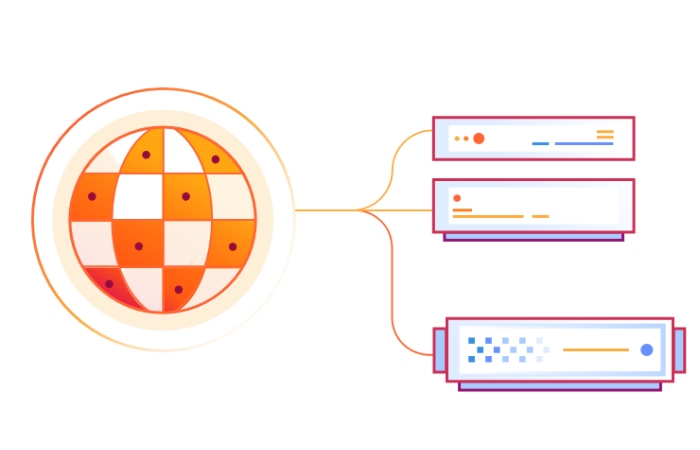Cloudflare is a website organization and security company that helps speed up and protect websites from cyber threats by routing traffic through its global network.
With digital presence being important, ensuring website performance, security, and reliability has never been more important. As businesses and individuals strive to maintain an online experience, services like Cloudflare have become essential tools in their arsenal.
But what is Cloudflare? Here’s a comprehensive guide.
About Cloudflare
Cloudflare is a principal content delivery network (CDN) and web security provider, serving small and large businesses to protect and accelerate their online assets. Founded in 2009, Cloudflare initially aimed to combat email spam but has since expanded to provide DNS and security services to millions of users. It is now one of the largest cloud computing networks, managing millions of domains and handling a large percentage of all internet traffic.
Cloudflare’s mission is to empower everyone on the internet. As one of the largest networks in the world, it powers faster, more secure apps for businesses, non-profits, bloggers, and anyone with an online presence.
A few free features that Cloudflare offers
Cloudflare offers a variety of services to improve website performance, security, and management:
- DNS Hosting: Interprets domain names into IP addresses, with Cloudflare managing DNS records for rapid propagation.
- Apps: Developed by third-party developers, these apps add various functionalities with a single click.
- SSL/TLS: Provides free SSL certificates for domain names and wildcard subdomains at the third level, ensuring secure connections.
- Firewall: Allows up to five rules to block traffic based on IP address, hostname, known bots, URI, and more.
- CDN: Caches and serves your website from the nearest geographical server, significantly improving loading speeds.
- Workers: Supports serverless functions in languages such as JavaScript, C, C++, and Rust for custom backend logic.
- Page Rules: Limited to three rules, offering functions like redirects and HTTPS rewrites.
- Analytics: Provides basic analytics to monitor website performance and traffic.
- Registrar: Offers domain registration at wholesale prices with free WHOIS redaction.
How to use Cloudflare?
Cloudflare makes websites and apps safer, faster, and more secure. Here’s a step-by-step guide to getting started with Cloudflare:
- Sign up: Begin by making an account on the Cloudflare website.
- Add your website: Enter your website’s domain name.
- DNS records: Follow the prompts to scan and confirm your DNS records.
- Choose a plan: Select a plan that lights your needs; a free plan is available.
- Update nameservers: Change your domain’s nameservers to the ones provided by Cloudflare.
- Configure settings: Set up your desired security and performance options.
- Activation: Once set up, will automatically begin protecting and optimizing your website.
- Manage and monitor: Log in to your account anytime to adjust settings and monitor performance.
When a visitor requests your site, Cloudflare connects to your site and retrieves cached data from the closest server, providing faster access than direct requests.
In addition, all data passing through Cloudflare servers is monitored, allowing us to block potential attacks and filter malicious traffic to improve the security of your site.
Benefits of Cloudflare

Cloudflare offers a multitude of advantages, such as:
Speed
High speed is a priority for website owners worldwide because of its impact on Google search rankings. Increasing website speed leads to better search engine rankings, higher conversion rates, and increased visitor satisfaction. When parts of your website are stored on multiple servers, each visitor request forces to deliver the information to the closest storage location. This significantly speeds up loading times, ensuring fast content delivery regardless of the user’s global location.
Free SSL Certificates
Cloudflare offers a free SSL certificate to ensure sheltered data transmission between your site and visitors. This improves the protection of sensitive information and can improve your website’s search engine rankings, as search engines prefer secure websites.
Security
Cloudflare is known for its strict security measures that protect your site from data leaks, bot attacks, and DDoS attacks. These features provide a high level of security while minimizing disruptions.
Connecting your site to protects your site and its DNS system. This prevents your real servers from being exposed when someone requests your domain name, as they only see DNS set.
In addition, Cloudflare allows users to customize firewalls with their own rules for increased security.
WAF security
Have you ever experienced an attack on your website? prevents and thwarts hacking attempts, ensuring your website remains functional and secure. By filtering spam attacks at the server name level, prevents malicious requests from reaching your server. It effectively protects your website from DDoS attacks, SQL injections, and comment spam, creating a safe environment for your website.
Page Rules and caching
Page rules are a powerful tool in the content delivery network that agrees website owners to customize what incoming requests do. These steps can include resetting the URL and file storage settings. Page rules are useful for setting different cache sizes and selectively bypassing caching for specific pages if needed.
This is not something Cloudflare does or offers. This was just a glimpse into what it can offer.
Conclusion
Cloudflare improves network speed and security for businesses of all sizes. It offers features like CDN, SSL/TLS encryption, and robust protection against online threats. Cloudflare’s user-friendly interface keeps websites running fast and securely. Don’t wait to add to boost your website’s performance. With Cloudflare, you can confidently protect and improve your site’s performance.

